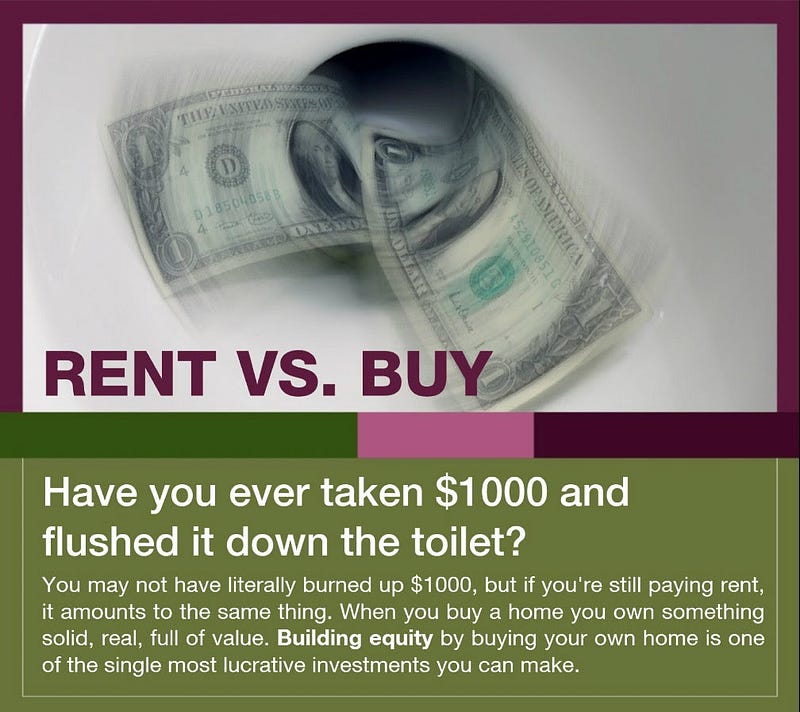Ultimately, however, we decided against buying a home for now.
Many friends and family have asked us why, but those bits of small talk were anything but germane to a deep dive through all the factors we considered. So, with this topic on the brain again, I’ve taken a few minutes to put these ideas down on (digital) paper for you, for us, and for whoever else is interested.
Here’s how it goes.
Sunk Costs
I think the logical place to start this is with two words: sunk costs.
Every month or two I get this email from our landlord. Technically it is from a property management company that he hired to do the job for him (get redirected here if you want to learn more about such a company). This is likely not the first time you’ve seen a message like this.

The concept here is obvious and very prevalent: if you’re renting, you’re wasting money. And it makes sense, right? Rent goes away. Equity builds toward the future. What could be wrong with that scenario?
But let me pose a question I began to ask which, on the surface, sounds extremely unlikely.
Is there ever a point at which the sunk costs of owning a home are greater than the sunk costs of renting?
Ready for a bit of math? Onward.
The (Hidden) Cost of Equity
When we looked at buying a home, we started to notice a lot of things we aren’t paying for now.
- Maintenance
- Mortgage insurance
- Closing costs
- Realtor fees
- Property tax
- Interest
Where we live currently, the small, single-family home we’d want to buy would cost about $250,000 so I’ve used that figure for the calculations below.
I’ve also used a time frame of 5 years.
The company I work for is great, but the nature of jobs and industries these days means that the chances that I’ll change jobs in the next 5 years is higher than not. Turns out, that’s about how often the average American moves, so I’ve used that window as a reference.
Specific Numbers
For the scenario I outlined above, here’s how the monthly numbers shake out assuming a $25,000 down payment on a 30-year loan at current interest rates which are right around 4.0%. Our monthly mortgage payment would be $1,074/mo ($324 of that toward equity).
- Mortgage Insurance: $111/mo
- Property Tax: $234/mo
- Maintenance Costs: $208/mo (based on 1% of home’s value per year which is considered the low end by many)
- Closing Costs: $108/mo ($6,500 spread over 5 years)
- Realtor Fees: $250/mo (6% fee — $15,000 — spread over 5 years)
- Share of Payment to Interest: $750/mo
- TOTAL MONTHLY SUNK COST: $1,661/mo
To use the language our landlord loves, if we bought a home right now we’d be flushing $1,661 down the toilet each month.
NOTE: Keep in mind I’m assuming utilities would be identical between a rented home and a home we owned.
Two More Numbers
But, of course, it’s not that simple.
TAXES: The next thing to consider is the tax deduction you get from the interest you pay on your home. I’ve played with a few calculators and the best number I can come up with for the scenario above is an annual tax savings of $3,200 or $269/mo.
APPRECIATION: Home prices rise, right? Well, they used to. The last decade has put a damper on that reason to buy a home. The best case scenario for this area is about a 1% rise in home values over the next few years. It’s far from guaranteed, but, as is, let’s toss in $2,500/yr in extra home value or $208/mo.
So, take that $1,661 in expenses and subtract the tax benefit ($269/mo) and the appreciation ($208/mo) and you’ve got a theoretical, monthly sunk cost of $1,184.
We are now close to finding an answer to our original question.
All we need to know is the sunk cost of renting. Luckily, it’s pretty simple, because the only sunk cost is, well, rent.
Which means, and this is the crux of my whole rambling post so pay attention, as long as our rent is less than $1,184/mo, the sunk costs of owning a home would be greater than the sunk costs of renting.
Wouldn’t you know it, our rent is $1,050/mo.
So for our situation — even under best case scenarios of appreciation and maintenance costs — we’re losing less money each month by renting than we are by buying.
To say this realization was unexpected would be an understatement.
What About Equity?
It turns out that equity is both the reason we all buy homes in the first place but also, in a lot of ways, kind of irrelevant.
I’ll do my best at explaining why.
Let’s say you and I are in a race to build $1,000 in equity. We both have $1,500/mo to spend on our homes. You buy a home and have a sunk cost of $1,174/mo, I rent a home and have a sunk cost of $1,050/mo. Who is going to reach $10,000 faster?
In those terms, the answer seems simple.
Every month you can put $326 into equity. Every month I can put $450 into savings. It will take you just over three months to accumulate $1,000. It will take me just over two.
As long as we save that money for a future down payment (future equity) and don’t blow it on a Porsche, right now we can build equity faster by renting than by buying.
Like I said, not the realization I expected.
Location
One more point I’m sure some of you are thinking, “Eden is more expensive than other places.”
And, yes, it is. Which means that, yes, sunk costs would decrease with a home in a different area. Keep in mind, however, that rent in those areas would also decrease. As far as my calculations have taken me, those sunk costs decrease proportionally.
There is always somewhere cheaper to live, but this concept held surprisingly true when I ran the numbers for each level.
Variable Sunk Costs
So are we ever going to buy a home? Yes. And we will partly because some of those sunk costs are variable. Specifically.
- Closing costs (the cost doesn’t change, but living in your home for longer before moving helps spread the cost out)
- Realtor fees (likewise, the less you move, the less you spend in realtor fees during your life and the more you can spread those out)
- Mortgage insurance (slowly goes down until, once you own 20%, it goes away)
- Interest
That last one is the big one because interest expenses shrink as equity grows. Which brings us to the next question I asked.
At what point do these variable sunk costs (especially interest) decrease to the point that I’d be losing more each month by renting?
There is no simple point-in-time answer to this one, but the gist for our situation is when either, a) we have enough cash to own roughly 25–30% of the home, or b) we know we’ll be somewhere forever (or at least 12–15 years).
Turns out seeing into the future is problematic, so “A” is the option I’m keeping in the back of my head for now.
Not Never, Just Not Now
We will buy a home before too long. Five years from now I wouldn’t be surprised if we’re homeowners. Ten years from now I think, barring major career setbacks, it’d be a sure bet.
But all of the number crunching and researching has been really eye-opening for us.
It’s taught us how important having a “home of our own” really is. It’s taught us to appreciate the overlooked benefits of renting. It’s taught us how one-sided mortgage and real estate marketing really is. It’s taught us that buying is good for many people, but not for everyone even if they can “afford it.” It’s also taught us the value of having our assets in the form of cash instead of equity which, when you think about it, is really handy.
We love the location of our home, we love not having to worry about maintaining it, and we love our quality of life. The financial perks were just the icing on top.
So, yeah, we’re renting, and we couldn’t be happier about it.
More Thoughts & Such
How do you check prospects’ websites for specific code, technology, and software?
April 30, 2024
Read this post →
How to Subscribe to Blogs / RSS Feeds via Email
February 16, 2024
Read this post →
A Little of Both
January 3, 2024
Read this post →
Put it On Paper
November 3, 2023
Read this post →
An Ode to Awe
October 16, 2023
Read this post →
Change Has to Be Sold
September 27, 2023
Read this post →
Knowing When to Stop
July 21, 2023
Read this post →
The Language of Uncertainty
July 21, 2023
Read this post →
Solving…Problems
July 7, 2023
Read this post →
Who am I? Who do I want to be?
June 29, 2023
Read this post →
